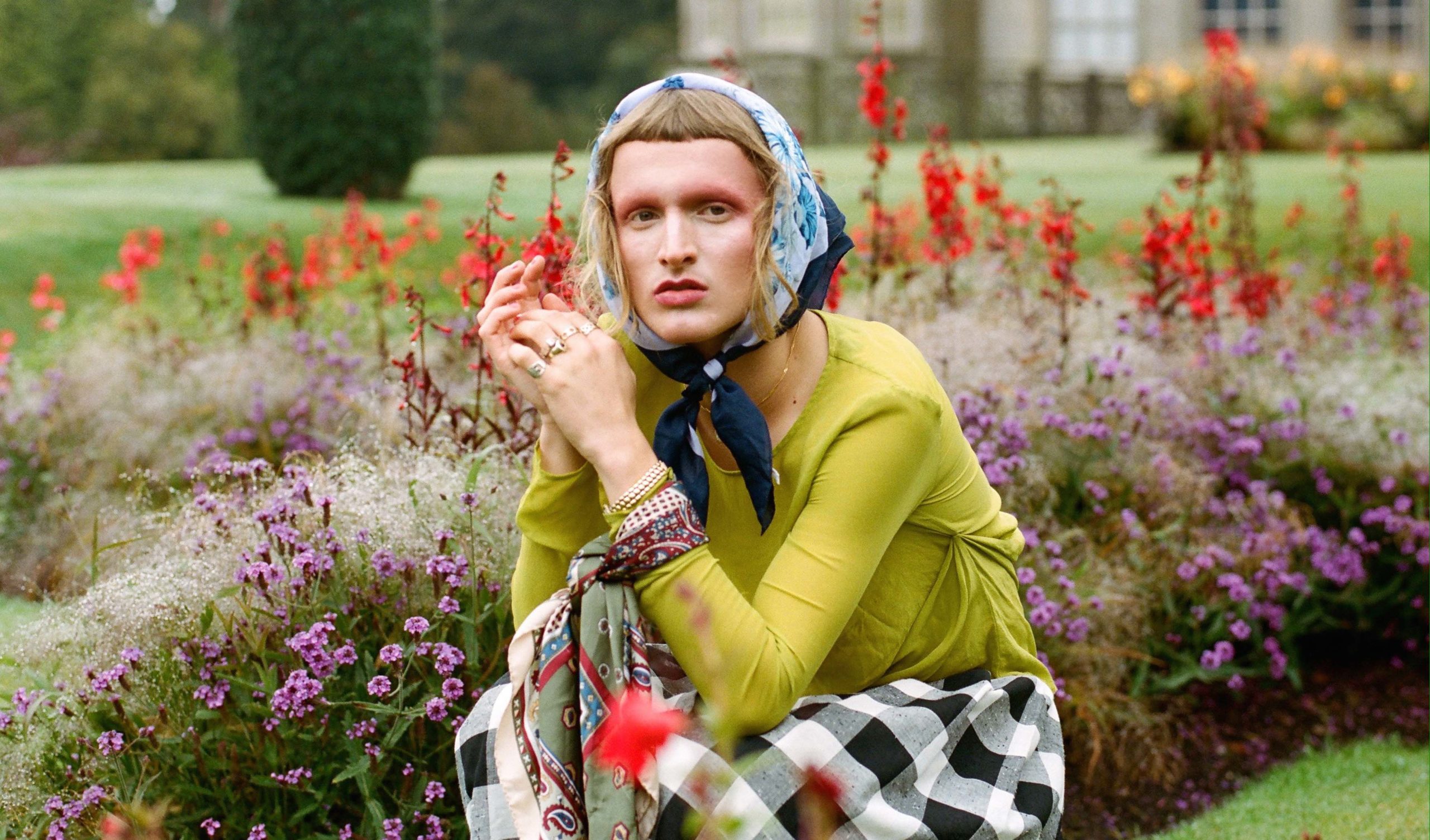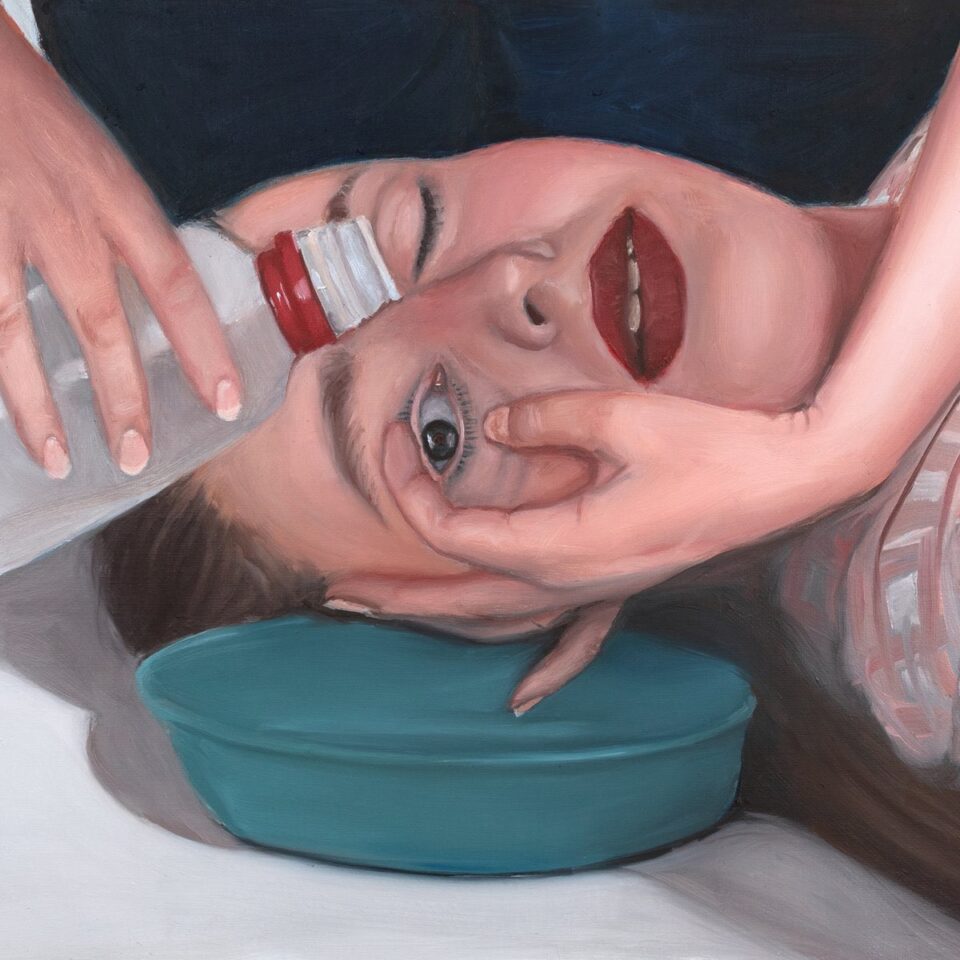We all know how powerful and moving music can be, but there are some rare songs that go way beyond those descriptors—songs that possess you and become you, songs you don’t just listen to but which you experience. “Hold Still,” by London-based artist Susan, is one of them. A powerful track that addresses the pain and passion of unrequited love, they explain it was inspired when, at the start of lockdown, they fell in love with one of their friends. It begins with nothing but a mournful cello—always the saddest instrument—but little by little, it builds up to create a slow, heart-crushing crescendo of beautifully sad truth.
It’s the first song from the 22-year-old following their cheekily titled Suepreme project, made for their final year university project and which involved a series of video, song, and merch drops—an incredibly tall and exhausting order, given that it was an entirely DIY affair. That hasn’t changed for this single—a link to the song and its stunning video, co-directed by Susan, arrived, unsolicited, in my inbox and simply stopped me dead in my tracks—but musically, Susan proudly explains over Zoom, this song represents a rebirth of who they are as an artist. Whereas their tunes before were more experimental—written from more of a production angle in mind—this saw a shift back onto Susan’s classically trained songwriting experience. The result is pure beauty, pure emotion, pure loss.
“Hold Still” is such a moving song that captures the pain of unrequited love perfectly. What’s the story behind it?
You know how you can fancy someone and it not be anything? Well, the pandemic was starting and I was living alone because my flatmate went back home. I was kind of in a desperate, pathetic place—I don’t think “pathetic” is a bad word, because I do think love is pathetic—and so when someone offers you a lifeline of even just listening to you, it’s easy for that to happen. And so the song is about feeling like you’re overstepping while knowing that you shouldn’t overstep—but also the pathetic part of love, going, “I’m not trying to overstep, but if you do fancy it I am here.”
Watching the video it seems pretty clear that the aesthetic of what you do is just as important as the music. Is that the case?
1000 percent. I thought it needed to just be a freestyle of emotion, and the emotion is unrequited love, if that’s an emotion—the sadness, desperation, and patheticness. Even though we scrapped the big glossy visual, the premise of the video was the same—it was just shot more quickly and at night in headlights, which I think worked better in the end. But when I write, I’m already thinking of the visual and I always want it to be perfect, just as much a song. The idea was just that I wanted the visual to be surrounded by “embrace” while also looking back, which is why we used a lot of found footage in the video. But really it’s just the idea of being held being all that anybody really wants.
Is it also a metaphor for identity? It seems like the two people in the video could be the two halves of you, separating and coming together and spinning around.
It is. It’s this whole thing of identity and knowing your identity and presenting yourself the best way possible. I think that’s also why I think a lot about the visuals and why I direct everything—because I need everything to show trans people as positively as possible. I think in every visual that I’ve directed I’m wearing a glamorous dress, for example, because I need me to look the best I can possibly look. This visual is a lot about my identity in another sense, too, because you need to know oneself in order to know that you’re not going to get loved back. If I didn’t know myself, I couldn’t write a song about the situation I was going through—I had to analyze it from my perspective and be like, “I’m never going to tell this person, because then I’ll lose this person as well.” Not to sound too much like RuPaul, but you can’t ask someone else to love you when you don’t love yourself.
And that’s why I don’t see the words “pathetic” and “bitter” as negatives—because I know I’m being pathetic and I’m owning that patheticness. So yeah, it’s about knowing oneself and owning it—me being in a fancy dress and Air Max, me by myself and then also me being held. It represents the duality of a person. And I think that relates to transness in a sense, because I think trans people are the people in the world who know who they are the fucking most, because you’ve got to through all of the doctors to be able to be told that you are yourself.
Which must be an even harder thing to go through in public, as you’re doing.
Growing up in the UK, things have changed very quickly. I remember when Sam Smith didn’t say he was gay until the album came out. I don’t really like to talk about transness in music—for so long I thought I should, but now I think that just being who I am is politically charged enough that I can sing about my life. If I’m singing about love, it’s not trans love, it’s love, and so I tend not to talk about it. But I tweeted about it the other day, because I’ve just got the green light for hormone replacement therapy, and what I really want to show in the visuals going forward is that my body will be changing, my face will be changing, this will be changing, that will be changing, and as an artist, what I want to do is ensure that each visual goes ahead as normal.
“Hold Still” is such a sad song, but talking to you, you seem to be this incredibly happy, positive, buoyant person. Humans are obviously a complex mess of extreme emotions, but what do you make of that contradiction?
With music especially, you’re allowing yourself to be vulnerable. I bite my tongue a lot. I learned throughout school that people don’t always need to hear what’s on your mind. You don’t need to be that person who always says when something is annoying or upsetting you. But with music, I can record something and have it be special to me. And even if I release it, I don’t have to tell you what it’s about—you interpret what you think I meant. I could write a song about my best friend, slagging them off, but if they were like, “Is that song about me?” I’d be like, “No, that’s for you to figure out!”
But I do think music is like a diary, and I guess deep down it’s OK to be sad. I’m very glass half-full in real life, but deep down when I get back into bed, I’m not always content. And you’re allowed to be not content and you’re allowed to be down. For me, music is a way of preventing that, in that I enjoy writing music, but I don’t enjoy writing a diary. “Dear Diary, today I feel shit.” That’s not for me. I’d rather put it in a song. I don’t even have to say it though lyrics—I can make a sound that it is how I feel. I always say about music that I can only do what’s available to me, and so why I feel really special about “Hold Still” is what was available was a cellist—a wonderful instrument played by my friend Lou, where I can tell Lou exactly how I feel. I can make a face to Lou and say, “I feel like this,” and he’ll be like “I got it!” And he’ll do it and I’ll be like, “That’s exactly how I’m feeling!” So together, we can create this sound that’s not just lyrically how I feel. It’s there already.







